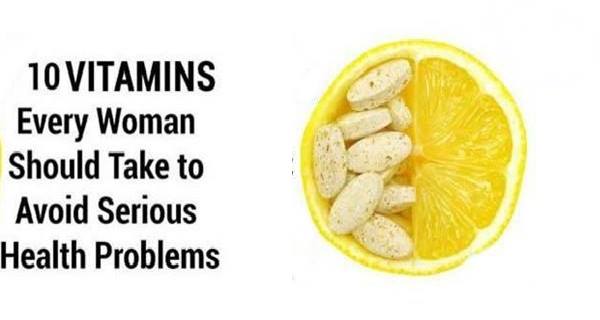Nowadays, women take proper care of their health and try to follow a healthy diet plan and lead an active lifestyle. This involves the consumption of all the needed nutrients in order to optimize their health and prevent serious health problems.
The following 10 vitamins are of great importance for all women:
Vitamin C
Vitamin C provides numerous health benefits and boosts the immunity. It accelerates the healing process, lowers the risk of cancer, tissue damage, and cardiovascular problems, and supports the tissue growth.
Vitamin C is also vital for the formation of red blood cells.The following foods are high in it:tomatoes, potatoes, oranges, broccoli, kiwi, grapefruits, peppers, strawberries, and sprouts.
Vitamin B7
Vitamin B7, or biotin, is needed for the growth of cells and synthesis of fatty acids. It promotes skin, hair, and sweat glands health, stimulates the growth of hair, and treats brittle nails.
It regulates cholesterol and is essential for bone growth and bone marrow. In some rare cases, people suffer from its deficiency, which leads to mild depression, anemia, rashes, brittle hair, abnormal heart functioning, and lethargy.
The following are the best food choices to consume it: carrots, lentils, cheese, nuts, egg yolks, fish, peppers, sweet potatoes, oatmeal, almonds, bananas, cantaloupe, yellow fruits, brown rice, green leafy vegetables, soybeans, milk, and yogurt.
Vitamin E
This vitamin has potent anti-aging properties which prevent cell damage and decelerate age-related changes in the body. It also prevents certain cancer types, memory loss, heart disease, and cataracts.
This vitamin is vital for the hair and skin, so it is often involved in skin and hair care products. It is found in foods like peanut butter, corn oil, spinach, wheat germ, cod liver oil, hazelnuts, almonds, margarine, corn oil, safflower oil and sunflower seeds.
Vitamin A
This vitamin acts as an antioxidant, and it helps the building and strengthening of the skin, bones, teeth, soft tissue, and mucous membranes. Vitamin A lowers the risk of chronic illnesses, boosts immunity, decelerates aging, and improves vision.
Foods rich in it include milk, papaya, kale, watermelon, carrots, eggs, peaches, liver, cantaloupe, spinach, apricots, pumpkin, tomatoes, guava, broccoli, papaya, red peppers, and fortified cereals.
Vitamin B6
Vitamin B6, also called pyridoxine, is vital for a healthy immune system, it aids the body to produce hormones and brain chemicals, and thus prevents memory loss, heart diseases, and depression.
It regulates blood sugar levels and treats morning sickness in the case of pregnancy. Yet, its deficiency may cause anemia. The following foods: seeds, fish, nuts, bananas, meats, fortified cereals, avocados, beans, oatmeal, and dried fruits, are high in vitamin B6.
Vitamin K
Vitamin K maintains normal blood clotting, strengthens the bones, and lowers the risk of cardiovascular issues. It is of high importance for energy and the normal function of the immune system. It can be consumed through fish oil, whole grain food products, soybean oil and green leafy vegetables.
Vitamin B9
Vitamin B9, or folic acid, is needed as it is very useful in the case of high blood pressure, heart disease, depression, cancer, and memory loss. Additionally, folic acid promotes brain health and cellular functioning, enhances fertility and fetal development during pregnancy.
Its deficiency in pregnant women leads to neural tube defects in the baby, like spina bifida. It is found in melons, eggs, beans, strawberries, dark leafy green vegetables, nutritional yeast, orange juice, asparagus, fortified grains, legumes, and nutritional yeast.
Vitamin B2
Vitamin B2 is also known as riboflavin, and it is essential for the metabolism, good health, and normal growth. It treats stress, anxiety, numbness, tingling, fatigue, strengthens the immunity, and boosts energy.
The lack of this vitamin causes poor immune system, affects metabolism and neural functions, and thus leads to wrinkles, itchiness, a sore throat, dry hair, pale eyes and tongue, mouth ulcers, and cracked lips.
Some foods high in it include milk, mushrooms, almonds, eggs, nuts, cereals, organ meats, cheese, yogurt, leafy vegetables, yeast, whole grains, and soybeans.
Vitamin B12
This vitamin is vital for proper cell division, metabolism, and protein synthesis, and protects against anemia, memory loss, and heart disease. Vitamin B12 treats depression and promotes a healthy function of the brain and a healthy nerve system.
Its lack may lead to depression, confusion, and irritability, as well as inflammation of the mouth and tongue. It is found in eggs, milk, cheese, fish, yogurt and fortified breakfast cereals.
Vitamin D
This fat-soluble vitamin helps the absorption of calcium, which is vital for strong bones, and it lowers the risk of certain cancer types, multiple sclerosis, and rheumatoid arthritis.
Moreover, vitamin D improves eyesight, relieves premenstrual syndrome symptoms, while its deficiency weakens the bones and contributes to osteoporosis.
The required daily dose of vitamin D can be obtained by a short daily exposure to sunlight. In the case of light skin, an exposure of 10- 15 minutes will be enough to produce vitamin D for the body. It can also be consumed through foods like eggs, liver, fatty fish, and fortified milk.
Therefore, the consumption of five servings of fruit and vegetables daily will provide the needed amount of vitamins. In case you lack some of these vitamins, you can also take vitamin supplements, but make sure you consult your doctor prior to starting any therapy.
